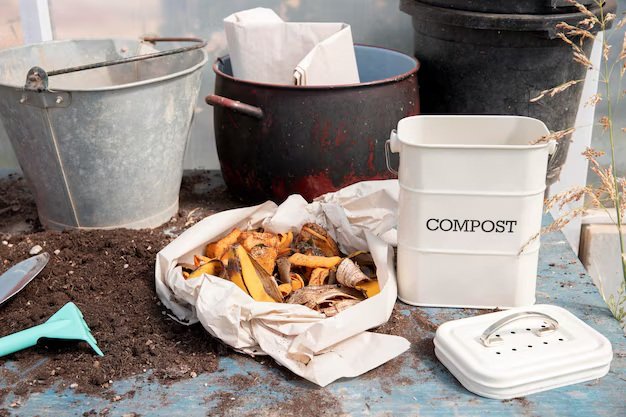Cow vs Sheep vs Pig vs Poultry Manure: Best Fertilizer
In a 20-year study conducted by Iowa State University, researchers found that poultry manure not only enhanced corn yields by 25% compared to synthetic fertilisers but also improved soil health indicators, such as particulate organic matter, and reduced nitrogen runoff by up to 16%. This compelling evidence underscores the transformative potential of animal manures in sustainable agriculture
As farmers and gardeners seek eco-friendly alternatives to chemical fertilisers, understanding the unique benefits and challenges of various animal manures becomes essential. Each type—cow, sheep, pig, and poultry—offers distinct nutrient profiles and soil-enhancing properties. In this article, we will examine these differences and offer insights to help you select the most suitable organic fertiliser for your unique agricultural requirements.

In This Article
- Nutrient Profiles of Common Animal Manures
- Poultry Manure: The Nutrient Bomb
- Cow Manure: The Soil Conditioner
- Sheep Manure: The Balanced Option
- Pig Manure: The Underutilised Resource
- Application Best Practices
- Conclusion: Making the Right Choice
Nutrient Profiles of Common Animal Manures
The effectiveness of manure as a fertiliser largely depends on its nutrient content, particularly nitrogen (N), phosphorus (P), and potassium (K). These three nutrients are essential for plant growth, and their concentrations vary across different types of animal manure.
| Type of Manure | Nitrogen (N) % | Phosphorus (P) % | Potassium (K) % | Notes |
|---|---|---|---|---|
| Cage Poultry Manure | 3.4% | 2.5% | 1.6% | Highly concentrated; excellent nutrient source |
| Poultry Litter Manure | 2.6% | 1.8% | 1.0% | Slightly less potent than cage poultry manure |
| Pig Manure | 1.9% | 2.5% | 0.7% | High in phosphorus |
| Sheep Manure | 1.7% | 0.5% | 1.2% | Balanced profile; similar to cow manure |
| Cow Manure | 1.5% | 0.5% | 1.2% | Lower nutrient concentration; often used in bulk |
Source: GRDC Update Papers
Poultry Manure: The Nutrient Bomb
Poultry manure is a nutrient-rich organic fertiliser, particularly high in nitrogen and phosphorus, making it especially beneficial for nitrogen-loving crops such as tomatoes, peppers, and melons. Its application not only provides a quick nutrient boost but also enhances soil structure by improving aeration and water retention. Moreover, poultry manure is often readily available and cost-effective, making it an attractive option for many farmers and gardeners.
However, it’s important to handle poultry manure with care. Fresh poultry manure can be too high in nitrogen, which may burn plants if applied directly. Therefore, composting is recommended before application. Proper composting involves maintaining the compost pile at temperatures between 131°F and 140°F for several weeks, with regular turning to ensure all material is adequately processed. This process not only stabilises the nutrients but also reduces the risk of pathogens such as Salmonella and E. coli, which can be present in raw manure.
In terms of real-world application, a 2025 study published in Agriculture, Ecosystems & Environment demonstrated that integrating poultry manure into organic vegetable production systems can significantly improve soil health and crop productivity. Additionally, research indicates that substituting chemical nitrogen fertilisers with chicken manure can increase soil total nitrogen content by up to 30% and soil organic matter by up to 61%, depending on the substitution ratio.

Cow Manure: The Soil Conditioner
Cow manure is a time-tested, natural way to improve soil health. In many farming communities, especially where crops and livestock are raised together, it’s a readily available resource that supports sustainable agriculture.
One of the key benefits of cow manure is its ability to enhance soil structure. When added to the soil, it increases organic matter, which improves aeration and water retention. This creates a better environment for plant roots, leading to healthier growth. Studies have shown that long-term application of cattle manure can improve soil physical attributes such as aggregate stability and reduce compaction.
Nutrient-wise, cow manure provides essential elements like nitrogen, phosphorus, and potassium, though in lower concentrations compared to some other manures. Its slow-release nature ensures that nutrients are made available to plants over time, reducing the risk of nutrient leaching and promoting steady plant growth.
Beyond individual plant health, cow manure contributes to broader ecological benefits. Research by the Soil Association Exchange indicates that integrating livestock, such as cows, into arable farming systems can increase soil carbon storage by about a third compared to arable-only systems. This integration not only enhances soil health but also promotes greater biodiversity, supporting more plant species per field.
However, it’s important to consider the practical aspects. Cow manure is bulkier and may require more effort to transport and apply compared to synthetic fertilisers. Additionally, while it enriches the soil, its nutrient content is lower than that of poultry manure, necessitating larger quantities for the same effect.
Incorporating cow manure into farming practices is a step towards sustainable agriculture. It recycles waste, reduces reliance on chemical fertilisers, and fosters a healthier ecosystem.

Sheep Manure: The Balanced Option
Sheep manure offers a balanced nutrient profile, making it suitable for a variety of crops.
One of the standout features of sheep manure is its well-rounded nutrient profile. It typically contains about 1.2–1.4% nitrogen, 0.5–0.7% phosphorus, and 0.8–1.0% potassium, providing essential nutrients for plant growth without overwhelming the soil. This balance makes it suitable for a variety of crops, from leafy greens to flowering plants.
In addition to its nutrient content, sheep manure is often available in pelletized form. These pellets are easy to handle and apply, reducing the mess and effort typically associated with raw manure. They also have the added benefit of a milder odour, making them more pleasant to work with.
Environmentally, sheep manure is a responsible choice. Its lower nitrogen concentration reduces the risk of nitrogen leaching into groundwater, a common concern with more potent fertilisers. This means it nourishes plants while being kinder to the surrounding ecosystem.
However, it’s important to note that sheep manure isn’t as nutrient-dense as some other options, like poultry manure. Gardeners may need to apply it more generously or supplement with additional fertilisers for nutrient-heavy crops. Availability can also be a factor; in regions where sheep farming isn’t prevalent, sourcing this manure might be more challenging.
Despite these considerations, the benefits of sheep manure are compelling. It enriches the soil, supports sustainable practices, and offers a user-friendly experience. For those looking to cultivate healthy plants while maintaining environmental integrity, sheep manure is a valuable tool in the gardening arsenal.
Pig Manure: The Underutilised Resource
Pig manure is rich in phosphorus and can be a valuable fertiliser when managed correctly.
Unlike synthetic fertilisers, it also adds organic matter to the soil, improving its structure and water retention over time. Studies have shown that applying pig manure enhances soil microbial activity, which is vital for nutrient cycling and overall soil health.
However, it’s not without its challenges. The strong odour can be off-putting, and there’s a risk of pathogens like Salmonella and E. coli if the manure isn’t composted correctly. Proper composting—reaching temperatures above 55°C—can effectively reduce these pathogens, making the manure safe for use.
Long-term use of pig manure has been linked to increased soil organic matter and improved soil structure, leading to better water retention and nutrient availability. In fact, some studies suggest that pig manure can replace chemical phosphorus fertilisers without compromising crop yields.
To maximise benefits and minimise risks, it’s crucial to follow best practices: compost the manure thoroughly, apply it at appropriate rates, and incorporate it into the soil to reduce nutrient loss. With careful management, pig manure can transform from a waste product into a valuable resource for sustainable agriculture.

Application Best Practices
Regardless of the manure type, proper application is crucial to maximise benefits and minimise risks.
- Composting First: Fresh manure can harbour harmful pathogens and high ammonia levels that may damage plants. Composting it—by piling it up, turning it regularly, and allowing it to decompose—reduces these risks and stabilises nutrients. For instance, composting chicken manure before application helps prevent plant damage and reduces odour.
- Know Your Soil: Before applying manure, conduct a soil test to understand its nutrient needs. This prevents over-application, which can lead to nutrient runoff and environmental issues. Regular soil testing ensures that you’re adding only what your soil lacks, promoting healthier plant growth.
- Timing Matters: Apply manure when your crops can best utilise the nutrients. For many crops, this means applying in the spring or early summer. Avoid applying manure in winter, as frozen ground can’t absorb nutrients, leading to runoff. Applying manure during the growing season aligns nutrient availability with plant uptake.
- Proper Storage: Store manure in covered areas to prevent nutrient loss through volatilisation or leaching. Covering manure piles reduces nitrogen loss and minimises the risk of water contamination. Proper storage ensures that the nutrients remain in the manure until you’re ready to use them.
Learn More: Natural Organic Matter: Examples and Its Critical Role in Sustainable Farming
Conclusion: Making the Right Choice
Selecting the best manure depends on your specific crop needs, soil conditions, and available resources.
- Poultry Manure: Ideal for crops that demand high nitrogen levels. Tomatoes, peppers, and melons benefit significantly from this manure, as it promotes vigorous growth and abundant fruiting. However, it’s not suitable for acid-loving plants like blueberries and azaleas, which prefer lower nitrogen levels.
- Cow Manure: Excellent for improving soil structure and long-term fertility. It’s particularly beneficial for root vegetables like carrots and beets, as well as leafy greens such as spinach and kale. The enhanced soil structure supports robust root development and overall plant health.
- Sheep Manure: Offers a balanced nutrient profile with easy application, making it versatile for various crops. It’s especially suitable for leafy greens and grasses, providing a steady release of nutrients that support consistent growth. The balanced N-P-K ratio ensures that plants receive essential nutrients without the risk of nutrient burn.
- Pig Manure: Rich in phosphorus, which is crucial for root development. This makes it particularly beneficial for root crops like sweet potatoes and other tubers. When properly composted, pig manure can enhance the growth and yield of these crops by providing the necessary phosphorus for strong root systems.
By understanding the characteristics of each manure type and implementing best practices, farmers can enhance soil fertility, boost crop yields, and promote sustainable agriculture.







